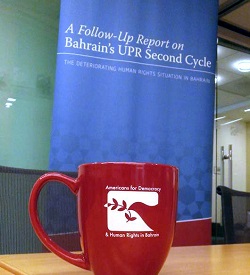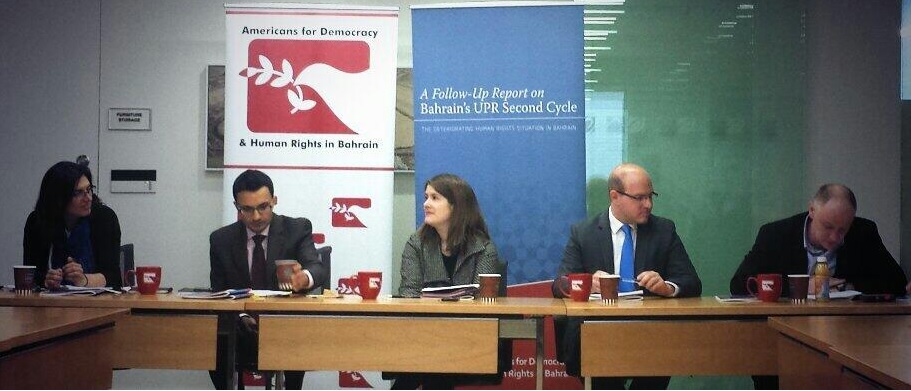On 23 April 2014, Americans for Democracy and Human Rights in Bahrain (ADHRB) hosted a launch event for its latest report titled A Follow-Up Report on Bahrain’s UPR Second Cycle: The Deteriorating Situation in Bahrain. Held at the Open Society Foundations, the event featured a panel discussion on Bahrain’s implementation of the recommendations it received through its Universal Periodic Review (UPR) process in 2012 and the importance of U.S. Government engagement on Bahrain at the United Nations. The panel included: Michael Payne, Advocacy Associate at ADHRB; Sanjeev Bery, Advocacy Director for Middle East and North Africa at Amnesty International USA; Sarah Margon, Acting Washington Director at Human Rights Watch (HRW); Delphine Halgand, U.S. Director at Reporters Without Borders; and Brian Dooley, Director of the Human Rights Defenders program at Human Rights First (HRF), as moderator.
Please continue reading or click here for a PDF of this statement.
Michael Payne gave the audience an overview of Bahrain’s UPR process, explaining that Bahrain underwent its first cycle of the UPR in 2008 and its second cycle in 2012 – directly following the 2011 crackdown on protests. During its second cycle, Bahrain either fully or partially accepted 158 of the 176 recommendations it received. Unfortunately, Bahrain has shown no significant progress towards implementing any of the recommendations it accepted. Mr. Payne discussed the July 2013 implementation of 22 recommendations passed through an extraordinary session of the Bahrain National Assembly, which classified many forms of free expression and assembly as terrorism-related offenses. As a result, there are currently 3,800 political prisoners in Bahrain, most of which have been convicted of or face charges relating to practicing their freedoms of expression and assembly.
Mr. Payne went on to discuss advocacy efforts on the situation in Bahrain at the United Nations Human Rights Council (HRC) in Geneva. He praised the three joint statements that have come from the HRC in as many years, but urged member states to commit to stronger action on Bahrain this year. Discussing the commitment Bahrain made at the HRC in March 2014 to submit a UPR midterm review at the HRC in September, Mr. Payne urged the international community to hold Bahrain accountable for implementing the recommendations. Specifically, Mr. Payne suggested the HRC should pass a resolution under Item 2 calling on the Bahrain government to meet specific achievable short-term goals, including:
- Release of all political prisoners held on charges related to freedoms of assembly and expression and repeal repressive national legislation that curtails rights to association, assembly, and expression;
- Allow U.N. Special Procedures representatives access to Bahrain to investigate complaints, specifically the Special Rapporteur on torture and other cruel, inhuman or degrading treatment;
- Establish a permanent office of the Office of the High Commissioner for Human Rights in Bahrain with a full technical and reporting mandate;
- Reform Bahrain’s National Institute for Human Rights and the Police Ombudsman’s office to ensure compliance with international standards regarding independence, accountability, transparency and credibility.
Mr. Payne concluded that the success of any such resolution at the HRC would require significant support and engagement from the United States.
Delphine Halgand discussed the ongoing persecution of media professionals and citizen journalists in Bahrain, citing cases such as citizen journalist Hassan Matooq, blogger Abduljalil al-Singace, and photographer Ahmed Maidan. This continued repression has resulted in Bahrain dropping 60 places in the past five years on Reporters Without Borders Global Press Freedom ranking. Currently listed at 163, Bahrain now ranks in the bottom 20, alongside countries like Iran and China.
Ms. Halgand argued that the Bahrain government hopes to achieve a “media blackout” to remove international attention of the situation in Bahrain through arrests and the postponement of trials for media professionals and citizen journalists. She noted that three journalists have been killed by security forces since protests began in 2011, but that no one has been held accountable. Ms. Halgand called on the Bahrain government to release all imprisoned journalists; investigate allegations of mistreatment and torture of imprisoned journalists; hold accountable those responsible for violence against the press; allow foreign journalists access to the country; and cease all forms of government censorship and intimidation.
Sunjeev Bery discussed the cases of Rihanna al-Mosawi and Nafeesa al-Asfoor as a way of demonstrating how human rights abuses in Bahrain have become institutionalized. Convicted of terrorism-related charges after being arrested during a protest at the 2013 Formula One Grand Prix, al-Mosawi and al-Asfoor brought complaints of ill-treatment and torture to the Police Ombudsman’s office; thus far, no report has been made public. Mr. Bery argued that the mishandling of such complaints is an example of the “shell game” Bahrain is playing, in which there is a “theory of reform, without the substance.”
Mr. Bery expressed deep concern that the repression in Bahrain has turned into “background noise” for the international community as stories of repression, intimidation, and abuse become the “normal state of affairs” for the country. Mr. Bery noted that while the Obama administration offers statements of support for an inclusive national dialogue, they do not offer any means of measuring success. He also noted that that it appears as though the Bahrain government has decided to accept the occasional statements of concern from the United States as “the cost of doing business” to preserve bilateral relations. As such, the U.S. must change its position on Bahrain and demand concrete steps towards reform, including the release of political prisoners and accountability for human rights abuses. Mr. Bery believes that a key litmus test for this relationship will be the release of human rights activist Nabeel Rajab from prison next month and how the U.S. reacts should he be subject to a travel ban upon his release.
Sarah Margon agreed that the Obama administration must do more to encourage reform in Bahrain, noting that the current policy has been seen as “one step forward and five steps back.” U.S. policy towards Bahrain has been couched in terms of national security and regional stability without taking into account the impact the cycle of popular discontent and government repression has had on these goals. Ms. Margon argued that the Bahrain government has conducted a “judicial masquerade” by trying human rights abusers in court but then giving them either light sentences or dropping the charges altogether.
Ms. Margon found cause for optimism in both the recent appointment of Mr. Tomasz P. Malinowski as Deputy Assistant Secretary of the Department of Human Rights and Labor at the Department of State and growing bipartisan concern within the U.S. Congress over the situation in Bahrain. While she urged the U.S. to be actively engaged on any resolution from the HRC, she cautioned against too strong a showing of U.S. leadership, noting that such leadership could cause the resolution to be watered- down.
During the Q&A, an audience member asked what more the U.S. Government and its citizens can do regarding the situation in Bahrain. Sarah Margon argued that building support within the U.S. Congressional Armed Services Committees is necessary to provide checks and balances on any military aid to Bahrain. There is a drive in D.C. to lead the conversation on Bahrain in the right direction, but human rights activists and NGOs concerned with the issue must keep in mind that this is “a marathon, not a sprint”, she said. Sunjeev Bery added that these actors must work harder to ensure stories from Bahrain move beyond D.C. and are translated for public consumption. They also need to build a spirit in which legislative outcomes are enforced by constituent pressure.
Audience member Matar Ebrahim Matar, a former Bahraini Member of Parliament, raised the point that the United States Department of State referred to Bahrain as a constitutional monarchy in their 2013 Country Report on Human Rights Practices in Bahrain, belying the optimistic angle Sarah Margon seemed to have regarding U.S. policy. Ms. Margon agreed that the United States does seem to have “gotten stuck” on the issue of Bahrain, but that with two years left in the current administration, there is still room for positive action.
Responding to a question from the audience comparing U.S. and European engagement at the HRC on Bahrain, Delphine Halgand argued that U.S. engagement is essential, as Washington’s interests in Bahrain are much stronger than Europe’s. Michael Payne echoed Ms. Halgand’s sentiments, stating that it is crucial that the U.S. be a strong and active partner on any action concerning Bahrain at the HRC.
Addressing a question regarding the relationship between the various opposition groups on the ground and their efficacy, Brian Dooley noted there is a sense of exasperation over the lack of results from the 2011 uprising, which the opposition hoped would be more effective. Sarah Margon stated that the United States doesn’t seem to have a solid read of the various opposition groups and their relationship to one another, but noted that the ongoing unrest in Bahrain could have very real consequences for U.S. security interests in the region and the continued viability of maintaining the presence of the Fifth Fleet in the country.
Expanding on Ms. Margon’s last point, a member of the audience asked if there is any value to including current and former military in the discussion of human rights in Bahrain. Ms. Margon emphatically agreed, stating that human rights concerns should always be integrated into larger strategic discussions on foreign policy. Brian Dooley agreed, lamenting that the current either/or approach to human rights and security, despite the fact that they go hand in hand.
Noting how the Bahrain government uses the acceptance of reform recommendations as a public relations tool, one audience member pondered over the importance of making recommendations for Bahrain if they are going to be misused. Michael Payne shared this frustration over such misuse, but argued that recommendations are a key tool in pushing for reform. He suggested that NGOs and U.N. member states can respond by improving the recommendations and benchmarks they give so they can be more effectively used to hold the Bahrain government accountable to reform.
Regarding a question on the type of training provided to human rights activists and opposition figures in Bahrain, Delphine Halgand provided an overview of the training that Reporters Without Borders provides to educate journalists on how to protect themselves online, as well as training on how to protect sources and materials when entering or leaving the country. Sanjeev Bery highlighted Amnesty International’s efforts to provide rapid response training to human rights activists in need of urgent assistance.






